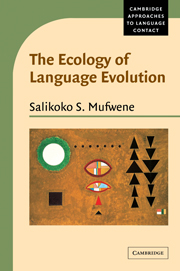
-
Select format
-
- Publisher:
- Cambridge University Press
- Publication date:
- December 2009
- August 2001
- ISBN:
- 9780511612862
- 9780521791380
- 9780521794756
- Dimensions:
- (228 x 152 mm)
- Weight & Pages:
- 0.554kg, 274 Pages
- Dimensions:
- (228 x 152 mm)
- Weight & Pages:
- 0.55kg, 276 Pages
You may already have access via personal or institutional login
Book description
This major 2001 work explores the development of creoles and other new languages, focusing on the conceptual and methodological issues they raise for genetic linguistics. Written by an internationally renowned linguist, the book discusses the nature and significance of internal and external factors or 'ecologies' that bear on the evolution of a language. The book surveys a wide range of examples of changes in the structure, function and vitality of languages, and suggests that similar ecologies have played the same kinds of roles in all cases of language evolution. Drawing on major theories of language formation, macroecology and population genetics, Mufwene proposes a common approach to the development of creoles and other new languages. The Ecology of Language Evolution will be welcomed by students and researchers in sociolinguistics, creolistics, theoretical linguistics and theories of evolution.
Reviews
"Mufwene's proposals will undoubtedly interest linguists and theorists of evolution alike." Interdisciplinary Journal for Germanic Linguistics and Semiotic Analysis
Contents
Metrics
Altmetric attention score
Full text views
Full text views help Loading metrics...
Loading metrics...
* Views captured on Cambridge Core between #date#. This data will be updated every 24 hours.
Usage data cannot currently be displayed.
Accessibility standard: Unknown
Why this information is here
This section outlines the accessibility features of this content - including support for screen readers, full keyboard navigation and high-contrast display options. This may not be relevant for you.
Accessibility Information
Accessibility compliance for the PDF of this book is currently unknown and may be updated in the future.


